
According to financial experts, a war with North Korea would have a devastating effect on the South Korean economy, and hurt other countries around the world. (Getty Images)

War between the United States and North Korea is swiftly becoming a real possibility as tensions between North Korea and the U.S. continue toward the boiling point. While a war could cause a catastrophic loss of life, economic experts are saying that a war with North Korea would have dramatic financial consequences as well.
According to Business Insider, Gareth Leather and Krystal Tan of Capital Economics, an economic research company, wrote on Wednesday that since World War II, most countries that have participated in war have seen a dramatic drop in their economic output.
"The experience of past military conflicts shows how big an impact wars can have on the economy. The war in Syria has led to a 60 percent fall in the country's GDP," wrote Leather and Tan.
Also, a dip in one country's economy often has ripple effects that hurt the economies of other countries.
According to Capital Economics, the most impact on a country's economy from a post World War II war was South Korea after the Korean War in the 1950s.
"The most devastating military conflict since World War Two, however, has been the Korean War (1950-53), which led to 1.2m South Korean deaths, and saw the value of its GDP fall by over 80%," wrote Leather and Tan.
If the U.S. and South Korea go to war with North Korea, these economic setbacks may be revisited.
The U.S. and North Korea have exchanged serious threats. President Donald Trump told reporters Tuesday that threats from North Korea would be met with "fire and fury like the world has never seen."
In response, North Korea released a statement from their state-run media that they were reviewing “military options to form attack positions” around the U.S. territory of Guam in order to “send a stern warning” to the United States.
Should a war begin, Capital Economics said that South Korea will have its economy hit the worst. Additionally, the South Korean economy is responsible for 2 percent of the global GDP — ranked 11th in GDP globally — meaning that its economic setback could be felt by other countries around the world.
A war would also interrupt supply chains, which would also affect economic outputs. Capital Economics compared this with Thailand's floods in 2011.
"Because of the huge disruption and damage they caused to the country's manufacturing industry," wrote Leather and Tan, "the impact on the economy was considerable. GDP in the final quarter of 2011 fell by 4% [year over year], led by a 16% contraction in manufacturing output."
They added, however, that the impact from a South Korean supply chain disruption would have a much greater impact, as "South Korea exports three times as many intermediate products as Thailand."
"In particular, South Korea is the biggest producer of liquid crystal displays in the world (40% of the global total) and the second biggest of semiconductors (17% market share)," wrote Leather and Tan. "It is also a key automotive manufacturer and home to the world's three biggest shipbuilders."
"If South Korean production was badly damaged by a war, there would be shortages across the world. The disruption would last for some time — it takes around two years to build a semi-conductor factory from scratch," they added.
This would have a devastating effect on the U.S. economy, according to Capital Economics.
"At its peak in 1952, the US government was spending the equivalent of 4.2% of its GDP fighting the Korean War. The total cost of the second Gulf War (2003) and its aftermath has been estimated at US$1trn (5% of one year's US GDP)," Leather and Tan wrote.
"A prolonged war in Korea would significantly push up US federal debt, which at 75% of GDP is already uncomfortably high," they concluded.
While war can have a negative effect on economies, it can also boost them, albeit temporarily. According to ThoughtCo., preparations for war boost the economy as the government buys up contracts for the development and manufacturing of equipment.
This causes companies to hire more employees, and fill the gaps left by men and women who were off to war. Unemployment goes down, and more people end up with money in their pockets.
ThoughtCo. pointed out that this relates to the "broken window fallacy." ThoughtCo. compared war spending to a shop owner whose window is smashed, and is forced to pay a sum to another company to fix it. That company and its workers benefit.
However, what is often dismissed is that the shop owner would have done something beneficial for his shop with that money, instead of fixing the window. While the glass company has gained, other businesses may have lost the shop owner's business for more productive reasons. In the end, only the glass company has benefited financially, while the shop owner has done nothing but lost money.
With war spending, the concept is potentially the same. The U.S. may spend money, creating jobs to manufacture equipment, and filling pockets. However, the money spent to buy expendable items for war may have been used for better reasons at home.
Also, once the war is over, many soldiers will return home seeking work. With war spending over, and the demand for work lessening, finding a job will be difficult. This will cause more to rely on government benefits, costing the government that had already spent a lot of money fighting the war.